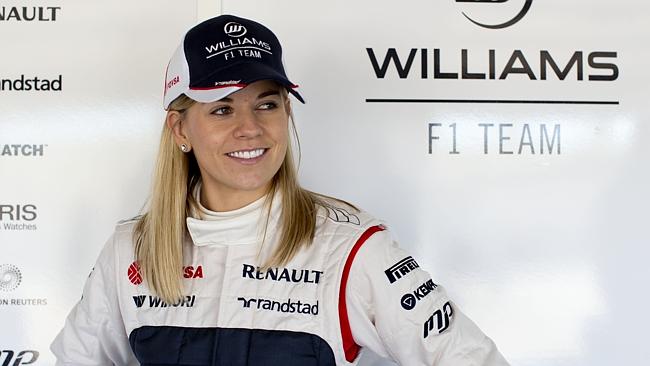Williams driver Susie Wolff talks about life behind the scenes in Formula One
AT just 31, Susie Wolff is one of just two women in the male-dominated world of motorsports. Check out what life’s really like behind the scenes.

AS THE Australian Grand Prix gets underway in Melbourne today, one woman will be watching with more interest than most.
Susie Wolff is the development driver for Williams, a role that sees her flying around the track at more than 300 kilometres and hour, testing the car ahead of team drivers Felipe Massa and Valtteri Bottas.
The 31-year-old, described in a BBC documentary as the “fastest woman in the world”, is part of a team of nearly 600 that live and breath life on the “paddock” in a gruelling schedule that sees them travel nine months of the year to Australia, Bahrain, Singapore and Brazil, among other places.
“I love the adrenalin and speed and competition, it’s the pinnacle of motorsport. To race F1 it doesn’t get any better, the cars to drive are just awesome,” she said.
The 53-kilogram driver took her spot in the team in 2012 after a lifetime of motorsports.
She grew up on the west coast of Scotland where her parents ran a motorbike shop, before hitting go-carts at age eight.
Before long she had worked her way up the ranks and was racing the likes of Lewis Hamilton and Kimi Raikkonen.
She’s now one of just two women in the male-dominated motorsports industry — a world ruled by competitiveness, secrecy and big budgets, where victory is a matter of milliseconds.
“The biggest thing is winning,” she said from beside the track in Melbourne ahead of today’s Grand Prix.
“The success is what we all aspire to. Getting over the finish line and bringing points home for the team, it’s very much a team effort.”
The male-dominated industry is also a hugely competitive place.
She trains five times a week to keep fit and bust the misconception that women can’t handle the demands of such a physical event.
“It’s quite competitive, there’s not much communication [between teams]. There’s too much at stake, everyone wants success. There’s respect for each other in the paddock but teams stick to their own and don’t communicate much with other teams.”
Her husband is also in the industry. Although as boss of rival team Mercedes, it doesn’t necessarily make things any easier.
“Sometimes after the race one is happy, one is sad, one has to lift the other one up,” she said.
Despite the danger, she doesn’t have time to be scared in an industry where she’s always thinking of the next challenge.
“As soon as I start to get scared, it’s time to stop racing.”




